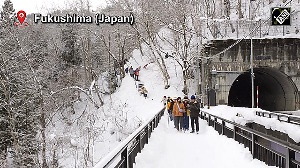Hundreds of kilometres of national and state highways in states like Maharashtra, Himachal, Uttarakhand, Rajasthan and others have turned into local, municipal or district roads, just a few days after a Supreme Court order banning liquor sale along highways.

Most states have not specified any reason for changing the categories and some have even denied that the step has been taken in view of the Supreme Court verdict.
Yet, most of the decisions have come in the wake of the March 31 order of the Apex Court, lending it the shape of a nation-wide trend.
Last week, the Maharashtra government okayed proposals from three municipal corporations to classify highways passing through their areas to city roads, while Himachal Pradesh re-notified 16 state highways as major district roads.
Maharashtra state PWD Minister Chandrakant Patil said that the government had received proposals from Jalgaon, Latur and Yavatmal municipal corporations seeking de-notification of the highways which were okayed.
The West Bengal government declared around 275 km of state highways passing through various municipalities as 'arterial roads'.
The notification posted on the state PWD website on March 16, came in between the Supreme Court order on highway liquor ban on December 15, 2016, and its reaffirmation by the apex court on March 31.
The state government did not give any specific reason for the denotification which covers stretches along all the 16 state highways.
Uttarakhand took a similar decision with its cabinet allowing denotification of state highways located in the areas of local civic bodies and re-categorised them as other district roads saying highway specifications were coming in the way of their maintenance and expansion.
The argument did not cut ice with the opposition Congress which claimed it was just a "pretext" for helping liquor trade which is a major source of revenue.
Some road stretches were denotified in Rajasthan while the Punjab government also denotified the bypassed stretches of seven state highways and turned them into a part of the city roads.
Officials of both Punjab and Rajasthan governments said that the denotified roads were only bypassed stretches.
Meanwhile, in Goa, the Manohar Parrikar government faced heat from some opposition leaders who demanded that he come to the rescue of the tourism industry in the state.
The Aam Aadmi Party demanded that the state government work towards getting state highways de-notified wherever legally feasible.
"India is a vast country...Goa is a tourist state, we need some relaxations. But I am not going to denotify highways," Parrikar had said at an event.
Union road, transport and highways ministry officials in Delhi said they had received "several requests" from different states to convert National Highways to district roads apparently to protect revenues.
Officials said they had received peculiar requests to de-notify national highways at a time when the Centre plans to take the length of such roads to 2 lakh km from the existing about 1 lakh km.
The ministry has received a request in writing from the union territory of Daman to de-notify some of its NH stretches while other states also expressed interest but were yet to sent proposals in writing.
Meanwhile in several places people protested attempts to relocate liquor vends in their localities.
Following such protest, the Uttar Pradesh government said that it would not allow shops which are have to relocated following a Supreme Court order banning sale of liquor along highways to come up near religious places, schools or populated areas.
In Maharashtra, police had to foil a bid by anti-liquor activists to march towards residence of a minister. The activists alleged that he had played a role in the state government's move to denotify the highways.
Representative image











 © 2025
© 2025